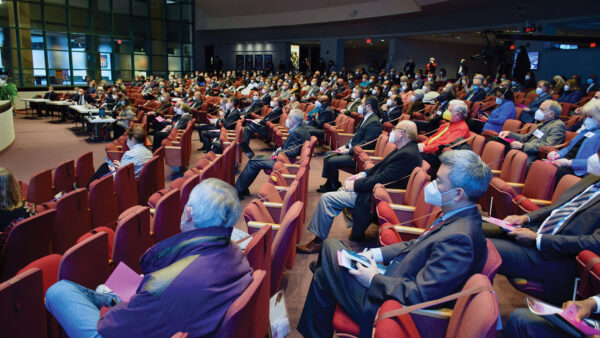Nearly 300 official participants at a Special General Conference (GC) Session voted to include a new section to Article V of the GC Constitution that will allow delegates at future GC Sessions to participate digitally if international disasters, pandemics, or unavoidable circumstances arise. The unanimous vote occurred during a one-day, one-item session at the Adventist Church’s world headquarters in Silver Spring, Maryland, United States, on January 18.
The voted amendment allows official delegates to participate in the upcoming June 6-11, 2022, GC Session, even if they cannot physically travel to the venue in St. Louis, Missouri, United States, because of the impact of the COVID-19 pandemic, church leaders said.
Because of current COVID-19 travel restrictions, the delegates for the special session were selected using primarily individuals who currently work at the GC headquarters in Silver Spring. These delegations were approved by each of the church’s world divisions and consequently voted by the General Conference Executive Committee on September 16, 2021.
The recommended amendment, voted by the GC Session delegates, reads as follows:
Article V. Sec. 4. Generally, regular or specially called General Conference Sessions are to be held in person and onsite. However, delegates when requested by the General Conference Executive Committee may participate by means of an electronic conference or similar communications by which all persons participating can hear each other at the same time, and participation by such means shall constitute presence in person and attendance at such a meeting. Votes cast remotely shall have the same validity as if the delegates met and voted onsite.
BACKGROUND TO THE VOTE
The January 18 Special GC Session had been voted on April 13, 2021, by the members of the GC EXCOM.
At the time, Adventist Church undersecretary Hensley Moorooven detailed factors considered in presenting this proposal. According to Moorooven, the GC Constitution stipulates that GC Sessions and all voting must take place in-person and onsite. Additionally, Article V, Section 1, of the constitution states that postponing a GC Session should not “exceed two years” beyond a regularly scheduled date. The possibility of another delay would put the General Conference out of compliance with its governing document. Moorooven also explained that amendments to the GC Constitution and Bylaws can be voted only by delegates at a regular or special GC Session. He affirmed that the proposal introduced and voted at the April 2021 meeting stays within the appropriate provision of the GC Constitution and Bylaws.
In 2020, a meeting of the GC EXCOM had already voted to propose an amendment to the GC Constitution that would allow for virtual participation when specifically requested by the Executive Committee.
Based on the authority granted to it in Article V of the Constitution to reduce the total number of delegates to a GC Session for reasons of a “major crisis within the church or international arena,” GC EXCOM had also voted on April 13 to reduce the total number of regular and at-large delegates to the January Special GC Session to 400 people. The allocated quota of delegates for the GC, 13 divisions, and two attached unions was approved as well. The motion included a request that divisions unable to send their allotted quota of delegates because of travel restrictions or other reasons be allowed to reallocate their unused quota of delegates back to the GC. The GC Administrative Committee then designated these positions to church members currently working at the GC headquarters or living in the immediate metropolitan area, primarily from the divisions which shared their quota.
FEEDBACK FROM DELEGATES AND LEADERS
At the January 18 Session, GC secretary Erton Köhler read and moved the amendment to Article V of the GC Constitution. Several delegates then approached the auditorium microphones to weigh in on the proposed amendment.
GC Education director Lisa Beardsley-Hardy said she appreciated the solution found, given the circumstances. “Things are going to get worse as we get to the end of time. This allows us to stay organized as we move forward,” she said.
Following the 59-minute meeting, GC executive secretary Erton Köhler responded to the day ’s events. “I was impressed by the strong support the delegates gave to the motion,” he said. “In situations like these, it is usual to get different opinions, but we received just a few observations. This shows to me that the church is united for mission.”
Köhler explained that the issue at hand was technical, unrelated to doctrinal or philosophical issues. “Still, it was important to approve it; otherwise, the work of the church may be hindered,” he said. “From the unanimous vote it was clear that delegates want the church to move forward.”
GC general counsel Karnik Doukmetzian also affirmed the significance of the brief meeting. “The vote to amend was significant in that it makes provision for the future in case meetings of the General Conference Session cannot be held in person to allow for individuals to be ‘present,’ ” Doukmetzian said. “World conditions may not allow for delegates to travel to be present in person, and this provision allows those delegates to participate and represent their territories even if they cannot physically travel to the site of the session.”
General Conference Executive Committee Votes to Allow for Hybrid 2022 GC Session
On Thursday, January 27, 2022, the General Conference (GC) Executive Committee met virtually to address items regarding the upcoming GC Session. After a short devotional and prayer time, members of the committee voted to enact the provision for hybrid meetings approved by the Special GC Executive Committee on January 18. The GC Session, which originally was postponed because of the pandemic and is now scheduled to convene in St. Louis, Missouri, from June 6 to 11, 2022, will be able to be a hybrid meeting. While delegates will still be encouraged to attend in person, this provision allows delegates facing pandemic challenges, inability to procure visas, or other extenuating circumstances, to participate by electronic means.



